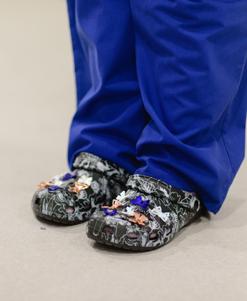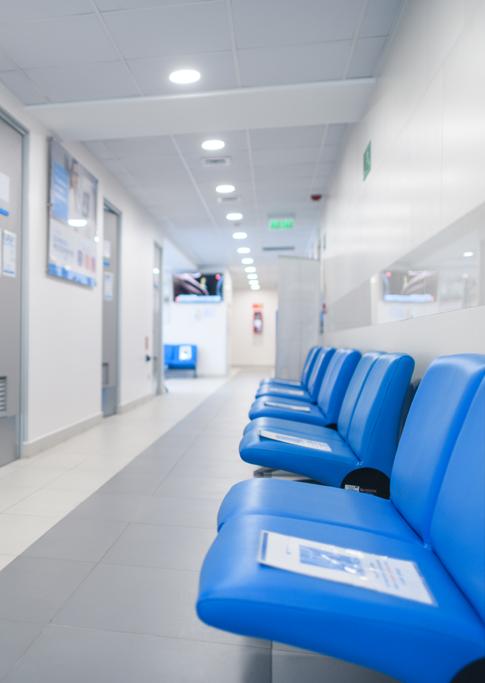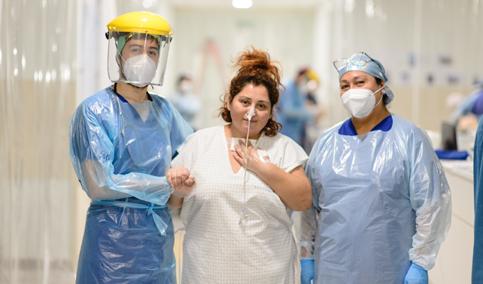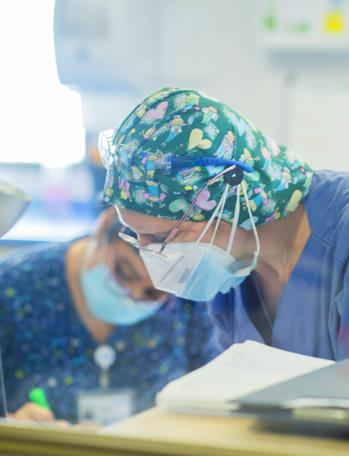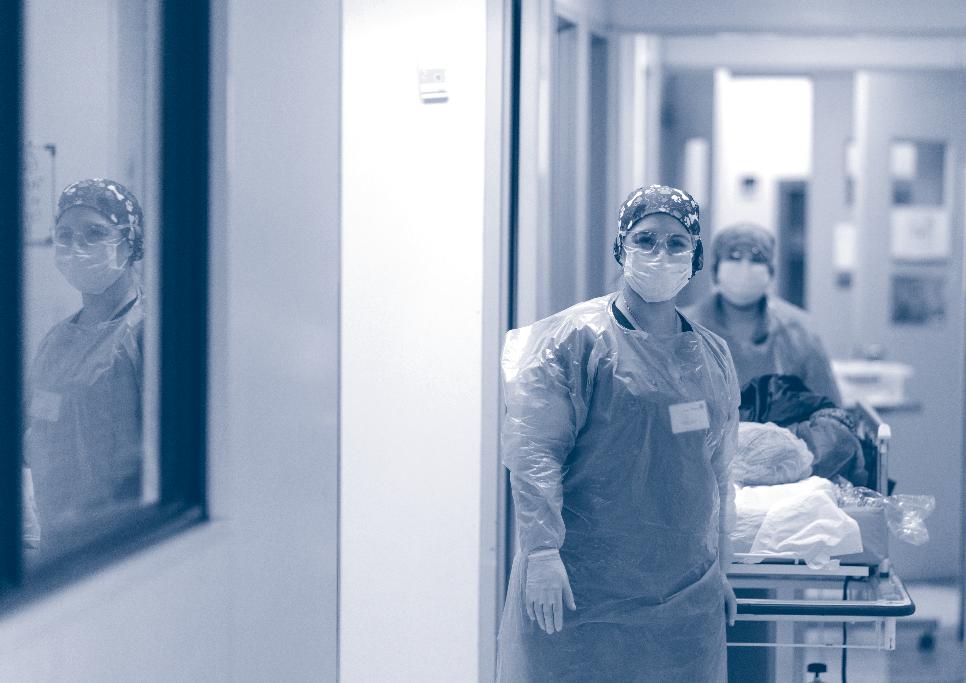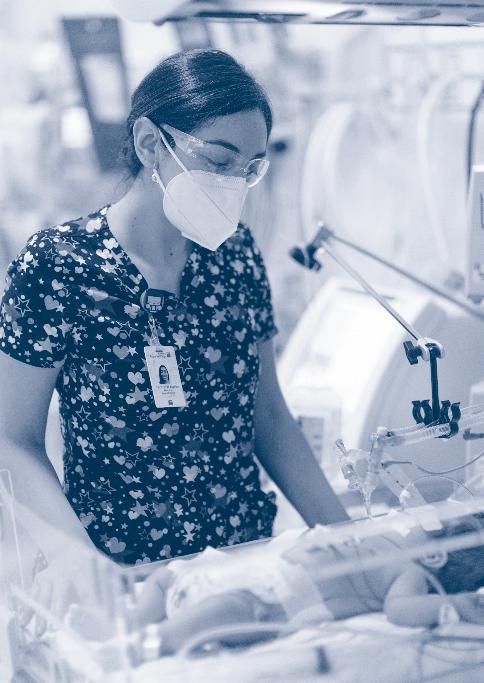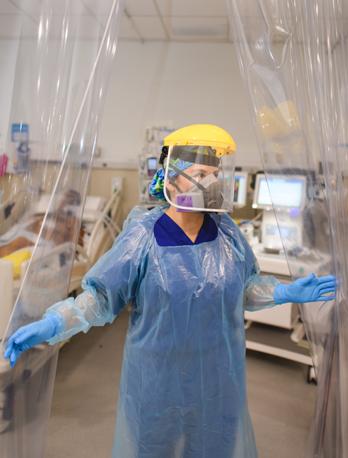
8 minute read
I remember how lonely the patients felt
In April the chaos started, the last half of April and into May, but even worse in June. Around the end of May, a message came out from the Ministry of Health which asked the isapres to give cae funds to all patients who were Covid positive, because it was obviously going to be a high cost disease, spending twenty days in an icu could cost millions of pesos. So these patients would have financial protection. From that moment, we had to review all cases, even closed cases. My work was to call about administrative issues, which could be really cold. You would have to say to the family: We are going to bring your dad in in an ambulance, so I need you to give me an address to send you the documents to sign. Though that sounds cold, you can say it in a kind way that shows you understand the anguish and fear the family are feeling. I worked 24/7 on that. I would be called at ten at night for a transfer and I would be there until two or three in the morning coordinating everything until the patient arrived at the hospital. It was all very difficult. Sometimes the family didn’t want to accept that their father be sent to another town. I often gave out my private number to families, and they would call and say: the icu doctor hasn’t called me for two days now. Or I would call them and they would say: we call but nobody answers, and I would check and find that they had the number wrong and that’s why the family hadn’t heard anything. What you often don’t realise is that there is a chain of administration events that have to happen so that this patient can get quality care and recover. That’s our invisible contribution. I am lucky that I practise and know about some alternative therapies. I practise yoga a lot and my teacher agreed to continue via video call. This has helped me a lot. They would call me at ten at We noticed at work that the clinical staff night for a transfer and I would were very anxious and exhausted. The head be there until two or three nurse came to me because she knows I am an “esoteric medium” as she calls it. So we in the morning coordinating brought yoga into the hospital and that has everything until the patient been great. Also, three weeks ago we started aromatherapy sessions in the icu and in the arrived at the clinic. emergency department. All with the support of the staff. I remember how I was shocked to learn that in Santiago, the icus started to be 99% full. The isapres would ask us to take patients into our icus, because some of the regions were going to collapse if we didn’t help out. I think we had the advantage of being almost a month behind the peak in Santiago, and also having hospitals the size of the Gustavo Fricke which were newly opened, so we could put in a lot of intensive care beds. We were able to contain Covid with the resources we had in the Region. When you looked at the statistics, we never went higher than 82 or 83% occupation of the ICU network, and although that is high, fortunately we never reached the number of 90 or 98% that happened in Santiago. Since I studied nursing, I have never worked much in hospitals, always in management. I think nurses are well prepared for working in management and administration. It is important that the administrative work we have undertaken during the pandemic is made visible as it has been very difficult and intense during the pandemic.�

Video consultations are here to stay
patricia gajardo Deputy Manager Outpatient Services Isapre Cruz Blanca Health Insurance
Why would you travel to a face-to face appointment? It doesn’t really make sense for less serious health issues that can be dealt with remotely.
We have looked after our beneficiaries by making sure they don’t need to go out for appointments, to stop the spread of the pandemic. Also by supporting healthcare systems, which are on the brink of collapse.
We have brought in video consultations, which is a service that has been around for a while, but the public in general hadn’t made the most of it. Perhaps because they didn’t really know how to use it, or didn’t trust it. I think the feedback has been amazing, considering that everyone in the organisation is working from home remotely.
I think this way of working has come to stay. It’s a great way of people not wasting time or risking infection when they go to A&E for something minor.
You have to remember that healthcare teams are exhausted right now. I have a daughter who is a nurse and works on the front line, and I can see she has lost weight and is very anxious. But that is not my only worry. My mother
SANTIAGO — CHILE

is 85 years old and has a complex cancer. She lives at home with a nephew. Not being able to visit her at all has been very stressful.
I think the company could easily have said: We will do what we are obliged to and nothing more. But the truth is that the company and I have always given more than we have had to, because we know this is an unprecedented situation and we need to be there for people. That has been really special.
I am a very positive person, and I think that through all this I have been able to react well and give our beneficiaries the answers they have needed. Our objective, during this time, has been to provide and maintain our services as much as possible.�
Non-Covid patients also need us
teresa fernández Nurse San José de Arica Hospital
«I am in charge of the intensive care unit here at the hospital. In March, we were preparing for Covid, but time went by and then they told us we were going to be a “clean” hospital, because another hospital would take the Covid patients. They even asked us for our ventilators. Personally, I think I could have done even more. I would have liked to have done my part in the pandemic, using my experience, because I worked for many years in the hospital in the intensive care unit. But I know we are doing our part, because the nonCovid patients need us and always will».

No statistics can show what people have been through
cristina satóstegui Nurse Hospital Sanitas La Zarzuela
I would come home from the hospital and take all the necessary precautions, because my husband is very vulnerable. We have three children. The two boys live with us and our older daughter is studying in the usa. We had to get her back to Spain and that was not easy. The borders were closed. We had a lot of problems, but we managed it in the end. Now I worry about my grandparents who don’t live with us but we do their shopping and they try not to go out. Thanks to my family and their support, I was able to dedicate myself totally to my work. On 9 March, our first Covid patient arrived. He was the only one in icu, where we have twelve beds and two isolation cubicles. I gave all my time to that patient and looked after him every day until he died. He was the first one to die of Covid in the whole hospital. Then it started to fill up. That’s how we ended up with four icu units with different functions. For example, I was transferred from the adult icu to post-surgical icu, and instead of having intensive care assistants we had anaesthetists. There were new doctors, new areas and surgical ventilators. Little by little, we managed to get all that we needed. The patients coming into the icu at that time came in to be intubated. Their oxygen saturation levels were very low. A lot of them had fever and some had diarrhoea. The patients couldn’t tell us if they had pain anywhere, because they were unconscious. The treatment was very aggressive and caused alterations to the liver. At first, we cared for them face down, but later on that changed. Putting the patient in that position needs a lot of staff and a lot of strength, which we didn’t have towards the end. We started to get used to all the clothes and the heat. You start to feel in control and that cheers you up.

We would have patients from aged 40 years old. There weren’t so many women. About 80% men and 20% women. A lot of them didn’t have underlying illnesses, but others did. Things like obesity and high blood pressure, mainly. We have had people of all ages at this hospital. There are no limits. Some people have been up to 85 years old. I think our death levels have been low, from what I’ve heard from colleagues from other hospitals. But of course, statistics are cold when it comes to talking about what we have been through. As far as consequences for people who have survived, I would say muscular problems are the most common. We set up a physiotherapy

